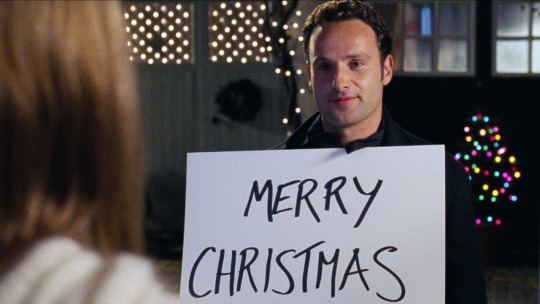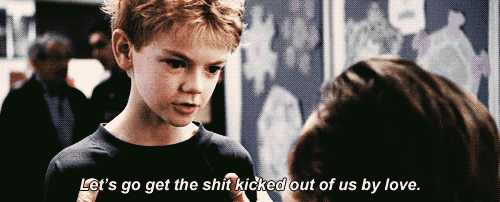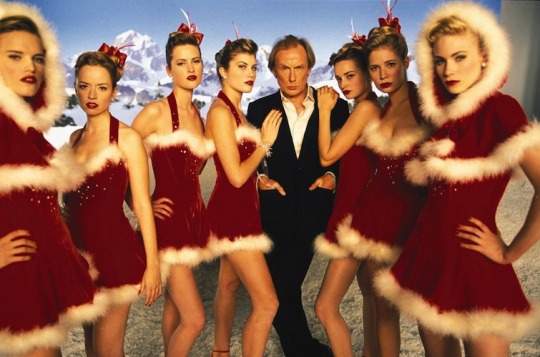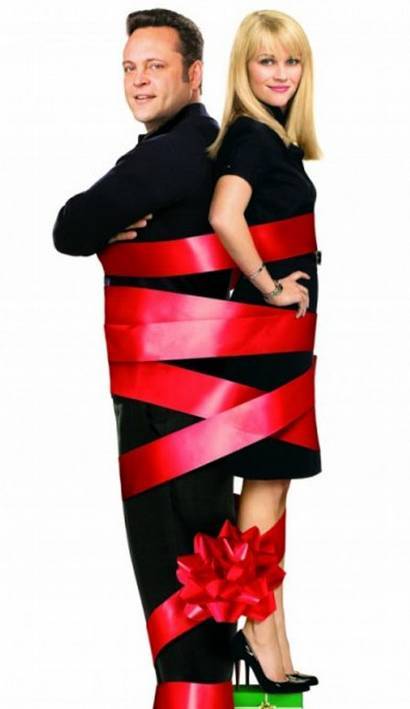The Multi-Storylined, Star-Studded Ensemble, Feel-Good Movie of the Holiday Season Brings Out the Scrooge in Me by Tom Roston
By Yasmina Tawil

Every holiday season, I experience movie-goers PTSD. I’m not kidding. My shoulders tense. My breathing quickens. When trailers play, I am struck with anxiety. I have flashbacks. I hear the Pointer Sisters singing and I have visions of a daffy Hugh Grant dancing down the stairs…
And then it happens. As inevitable as “Jingle Bells” playing, yet far more loathsome; the multi-storylined, star-studded ensemble, feel-good movie of the holiday season (MSSSEFGMHS) appears. They’re virtually interchangeable, like an attack of the clones. They tend to be either love stories or family comedies or both. Either way, I’m struck with disappointment. I am baffled by their cloying, plodding return. And then I try to avoid them at all costs.
This began, for me, in 2003. The film: Love, Actually.
Directed by Richard Curtis, best known for writing Four Weddings and a Funeral, Notting Hill, and other British rom-coms. Love, Actually is filled with every cliché imaginable. It is insufferably saccharine and seemingly unexpected things that aren’t at all unexpected happen about every ten minutes.
But I’m not writing this piece to tear this one movie down. I don’t want to get too deep into the particular badness of Love, Actually, other than to say that what happens so often is so ludicrous that it plays like farce or a fable. For just one example, Liam Neeson’s character repeatedly talks about how the only girl for him would be model Claudia Schiffer and, toward the end of the film, sure enough, he meets another character, played by Claudia Schiffer!

What’s so flawed about these seeming moments of whimsy or magic or whatever is that the film plays itself as if it is in the real world within the logical rules of the universe. And when it repeatedly diverges from that real world reality, it bursts at the seams. Not only that; there’s a central character, played by Bill Nighy, who is an aged, cynical musician who trashes the false sentiments of the holidays as a sort of wink to the audience that the film understands what it’s doing. And yet the movie drowns in a vat of egg nog of the very same sentiments. The movie is totally schizophrenic.
Which brings me to the point I want to make here. It’s about the identity of a film. Maybe I give them too much credit. But I think of every film as a sovereign being, one that should have that dark night of the soul, the existential moment that we humans have when we ask ourselves, why am I here?
Now, when a Quentin Tarantino or Paul Thomas Anderson or Steven Spielberg movie arrives in theaters, it knows exactly why it’s there: because its creator wanted to make it. And if a Tom Cruise Mission: Impossible movie comes out during the summer, it also knows why it exists: because Tom wanted it made, to get butts into seats and to make money for Paramount Pictures.
I simplify, of course, but I think you get the point.
Actually, Love, Actually, for all of its flaws, isn’t a worthless film. The acting is good, as is some of the writing. Production values are top notch. And it is effective in its ability to pluck heartstrings so well that I couldn’t help appreciating it on a more recent viewing. Its putative identity, to be fair, is to tell the story of love. (I can hear violins playing already.) But what bothers me so much is that it fails at its mission. It’s not an individual. It is a clone. Or a projection of what it wants to be. There’s no there there.

Now, I’m not naïve. I know that most movies are the result of conveyor belt production lines. But it’s the blatant nature of the MSSSEFGMHS. “Oh, it’s holiday time? Let’s see if there’s a cute movie coming out for the family to be reminded of the true spirit of Christmas,” blah blah. When a MSSSEFGMHS comes out, it can’t help itself but be a vessel, an automaton, a cookie-cutter confection cut from some old dough.
And please don’t accuse me of being a dude who doesn’t appreciate chick flicks. That’s disrespectful. Beaches? One of my all-time favorite films. Brokeback Mountain? Gets me every time.
And it’s not that I hate all ensemble films either. The problem with many of them is that they are thinly veiled conceits masking as stories. True, I dislike most ensemble movies for the above reasons (see Crash), sometimes they work. Usually when directed by Robert Altman.
But it’s the MSSSEFGMHS that is especially upsetting. A couple years ago, I wanted to write a story about Malcolm Lee, the director of the fun, funny The Best Man and other fine films, and who is unfortunately often referred to first as Spike Lee’s cousin. Because of desire to write about Lee, I guess I had my guard down, and I went and saw his Best Man Holiday, which is, of course, an African-American MSSSEFGMHS, or AAMSSSEFGMHS.
It’s a dreadful film; as bad, if not worse than Love, Actually, which is, I guess encouraging (equal opportunity to fail and all) regarding the question of race in this country. But maybe not. The fact that there’s an AAMSSSEFGMHS (see This Christmas with Delroy Lindo, Idris Elba, Chris Brown and Regina Kind or The Perfect Holiday with Morris Chestnut, Gabrielle Union, Faizon Love, Queen Latifah, and Terrence Howard) category makes me worry that in order to meet some annual quota for including people of color in their movies, studio suits have tried jamming as many black actors as they could in end-of-the-year movies rather than green lighting good scripts that happen to star African-American actors.
Which raises the issue of casting the MSSSEFGMHS. It’s about spectacle. It’s shock and awe casting. Doesn’t work for me. They collapse under their own weight. But, in Hollywood, the concept appears to have legs.
Here are some other MSSSEFGMHS, with varying degrees of emphasis on star wattage or holidayness or emphasis on the ensemble, but all appear to be the result of a computer processing Q ratings. What else would explain the stupefying casting of Jude Law together with Cameron Diaz and Kate Winslet with Jack Black (Holiday)?
-
The Family Stone (Claire Danes, Diane Keaton, Rachel McAdams, Dermot Mulroney, Craig T. Nelson, Sarah Jessica Parker, Luke Wilson).
-
Four Christmases (Vince Vaughn, Reese Witherspoon, Robert Duvall, Sissy Spacek, Jon Voight, Jon Favreau, Mary Steenburgen).
-
New Year’s Eve (Michelle Pfeiffer, Halle Berry, Jessica Biel, Robert De Niro, Zac Efron, Seth Myers, Jon Bon Jovi, Common, Sofia Vergara, Katherine Heigl, Cary Elwes, Carla Gugino, Sarah Jessica Parker).
New Year’s Eve is directed by Gary Marshall, who has made some good movies and a couple great ones (see Beaches), but who has started to tap this vein like a crazed junkie: he made Valentine’s Day (Jessica Alba, Jessica Biel, Kathy Bates, Bradley Cooper, Jamie Foxx, Jennifer Garner, Topher Grace, Anne Hathaway, Ashton Kutcher, Julia Roberts, Shirley MacLaine). And next year, with Mr. Marshall at the helm, we can look forward to Mother’s Day (Julia Roberts, Jennifer Aniston, Kate Hudson, Timothy Olyphant, Jason Sudeikis).
I swear to Christmas, I’m not a hater. I have so much love in my heart. I’ll show you. I even have love for a MSSSEFGMHS, one of the earliest ones, in fact—who knows, maybe it helped create the template—Home for the Holidays, the second film directed by Jodie Foster, in 1995, which stars Holly Hunter during her prime, Robert Downey Jr. when he could do no wrong, and a strong cast of Anne Bancroft, Charles Durning, Geraldine Chaplin, Dylan McDermott, and Claire Danes, when she was a kid. Maybe it’s because it was the first time I saw a MSSSEFGMHS, but the loopy familial antics were reasonably loopy and the dramatic reveals were suitably dramatic and revealing.

But that was then. As I looked ahead to this holiday season, I was actually beginning to think that a MSSSEFGMHS wasn’t going to terrorize me. I checked the schedules. Nothing appeared to be on the slate. And then, as I was writing this very piece, I got an email invitation to Love the Coopers, which is actually described as such:
Love the Coopers follows the Cooper clan as four generations of extended family come together for their annual Christmas Eve celebration. As the evening unfolds, a series of unexpected visitors and unlikely events turn the night upside down, leading them all toward a surprising rediscovery of family bonds and the spirit of the holiday.
This is such standard, by-the-book MSSSEFGMHS copy, it makes me shudder. Like realizing the sound under the bed is really a sound, not my imagination. The film stars Alan Arkin, John Goodman, Ed Helms, Diane Keaton, Anthony Mackie, Amanda Seyfried, Marisa Tomei, and Olivia Wilde. Great actors who have done great work. But here? Sure, there may be great moments and good acting and even stellar writing. But this isn’t a movie. It certainly isn’t cinema. It’s the result of an equation. Yeah, that’s right. It’s a product. And I’m not buying it.


